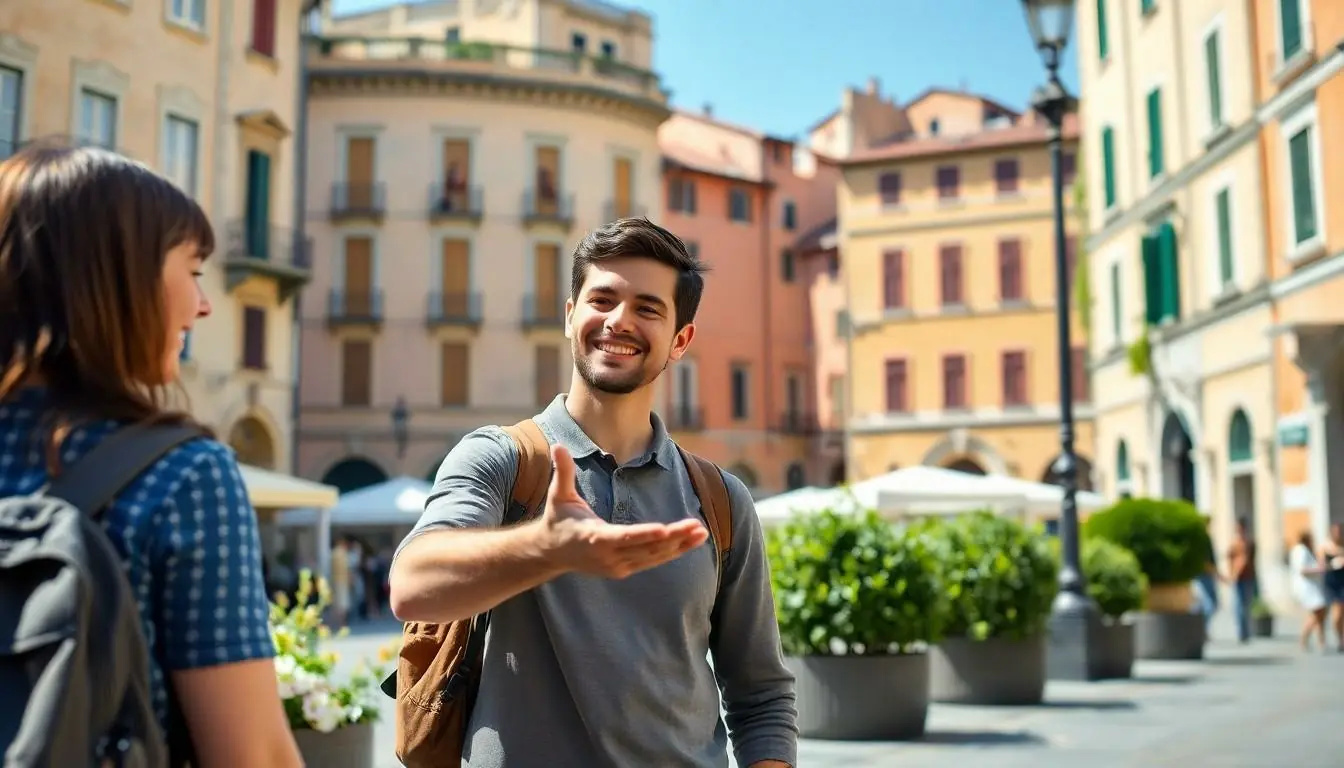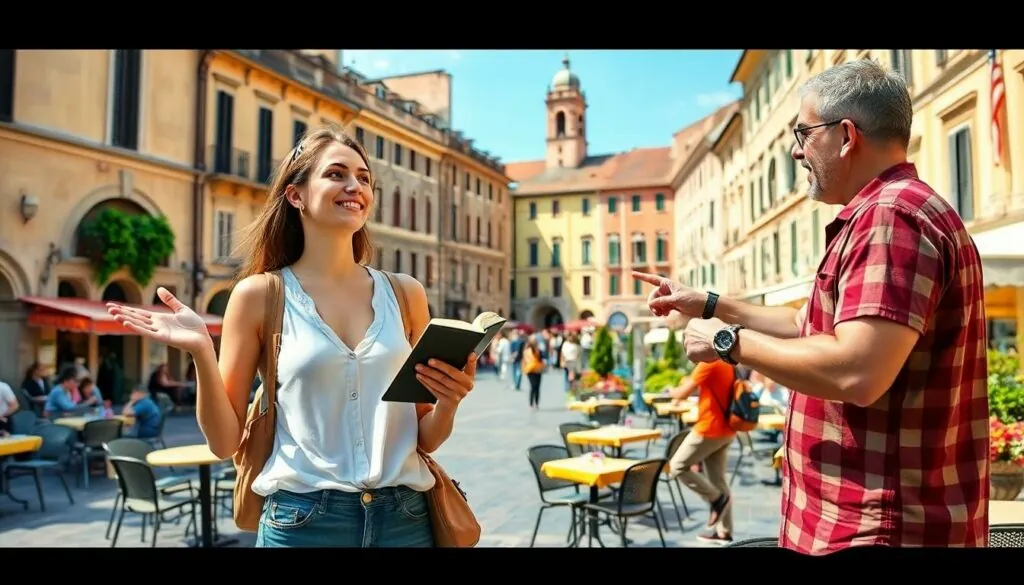Table of Contents
TogglePlanning a trip to Italy? Get ready for mouthwatering pasta and breathtaking views, but don’t forget your Italian survival kit! Knowing a few basic phrases can turn a simple meal into a culinary adventure and transform a wrong turn into a delightful detour.
Importance Of Learning Basic Italian Phrases For Travel
Knowing basic Italian phrases greatly enhances the travel experience. Communication becomes smoother and more enjoyable with locals, making interactions richer. Travelers often feel more confident when engaging with Italian speakers, whether ordering food, asking for directions, or exploring cultural sites.
Understanding essential phrases eases navigation through unfamiliar places. Locals appreciate when visitors make an effort to speak their language, often leading to improved service and recommendations. Additionally, knowing simple phrases can assist in emergencies, enabling travelers to seek help more effectively and access essential services.
Meals transform into diverse experiences when diners understand menu items and local specialties. Engaging with the culture through language deepens the traveler’s connection, offering a more authentic Italian experience. Familiarity with greetings, polite expressions, and cultural cues fosters warmer interactions and creates a sense of belonging.
Learning basic Italian phrases also proves beneficial in settings beyond restaurants, such as shops, hotels, and tourist attractions. Travelers frequently gain insights about traditions and customs when they communicate in Italian. Conversations spark interest in local art, history, and festivals.
Time spent mastering these phrases pays off substantially. In turn, a traveler’s confidence increases while exploring Italy, making the journey not just about the sights, but also about the connections formed along the way. Embracing the language enhances every aspect of travel, resulting in unforgettable memories and meaningful encounters.
Essential Greetings

Knowing essential greetings boosts interactions in Italy. These phrases help create a friendly environment and encourage positive connections with locals.
Common Greetings
Simple greetings provide the first step in communication. “Ciao” serves as an informal hello and goodbye among friends. “Buongiorno” expresses good morning, while “Buonasera” conveys good evening. Use “Arrivederci” to say goodbye in a more formal way. Locals appreciate hearing these greetings as part of everyday conversation.
Polite Expressions
Polite expressions enhance interactions and show respect. “Per favore” translates to please and shows courtesy when making requests. “Grazie” means thank you, essential after receiving help or advice. “Mi scusi” allows for an apology or to get someone’s attention politely. Including these phrases in conversations strengthens cultural bonds and encourages warmer responses from locals.
Useful Phrases For Navigation
Navigating through Italy can be seamless with a few essential phrases. Knowing how to ask for directions and communicate about transportation enhances the travel experience.
Asking For Directions
To inquire about directions, phrases like “Dove si trova…?” (Where is…?) work effectively. Asking “È lontano?” (Is it far?) helps gauge the distance to landmarks. Travelers can also say, “Può aiutarmi?” (Can you help me?) for assistance. Utilizing “A sinistra” (To the left) or “A destra” (To the right) clarifies specific turns. Saying “Vicino” (Close) or “Lontano” (Far) allows for more precise questions. These phrases bridge communication gaps and encourage friendly interactions with locals.
Transportation Vocabulary
Transportation vocabulary simplifies getting around. “Dove posso trovare la stazione?” (Where can I find the station?) is essential for train travel. Knowing “Biglietto” (Ticket) and “Autobus” (Bus) proves useful when purchasing travel passes. Asking “A che ora parte?” (What time does it leave?) ensures timely arrivals. Utilize “Treno” (Train) to identify train services. Understanding “Direzione” (Direction) helps clarify travel routes. These phrases enable smooth navigation through various transportation options in Italy.
Dining Out In Italy
Dining out in Italy offers a memorable experience filled with delicious cuisine and vibrant culture. Knowing some essential phrases can significantly enhance this experience.
Ordering Food And Drinks
When placing an order, phrases like “Posso avere…?” (Can I have…?) work well. Travelers often use “Vorrei…” (I would like…) to make requests more polite. Asking for recommendations using “Cosa consiglia?” (What do you recommend?) engages the staff and might yield delightful surprises. Mentioning preferences helps too; saying “Senza…” (Without…) lets diners clarify dislikes or allergies. When it’s time to pay, “Il conto, per favore” (The check, please) signals the end of the meal.
Common Restaurant Terms
Understanding restaurant vocabulary eases communication. “Menu” refers to both the menu and food options available. “Antipasto” signifies appetizers meant to stimulate the appetite. “Primo” indicates the first course, usually pasta or rice, while “Secondo” denotes the main dish, often meat or fish. “Dolce” indicates dessert choices. Familiarity with these terms enhances the dining experience, allowing travelers to navigate their meals with confidence and ease.
Accommodations And Reservations
Basic phrases for checking in and out can simplify the lodging experience in Italy. “Ho una prenotazione” (I have a reservation) confirms a booking at the reception. Asking “A che ora è il check-out?” (What time is check-out?) clarifies expectations for departure. When requesting assistance, “Può aiutarmi?” (Can you help me?) opens doors for support. Understanding these phrases turns a potentially stressful process into a smoother transition.
Inquiring about amenities helps ensure a comfortable stay. “C’è Wi-Fi gratuito?” (Is there free Wi-Fi?) addresses connectivity needs. Asking “Dove si trova la piscina?” (Where is the pool?) directs guests to leisure facilities. “Offrite colazione inclusa?” (Do you offer breakfast included?) ensures meal options are clarified. Knowing these useful phrases enhances the guest experience and fosters effective communication with hotel staff.
Cultural Tips When Using Italian Phrases
Understanding cultural nuances enhances communication in Italy. Always greet locals with a smile. A friendly demeanor makes interactions more enjoyable. Use the appropriate greetings based on the time of day to show respect, such as “Buongiorno” for morning and “Buonasera” for evening.
Engaging in conversations requires active listening. Pay attention to body language and responses. People appreciate when visitors actively engage and show genuine interest in their culture. Adopting a respectful tone when asking questions can lead to more informative answers.
During dining experiences, show gratitude. Using “Grazie” after receiving service encourages positive interactions. Asking for recommendations, such as “Cosa consiglia?” helps not only in choosing meals but also in building rapport with restaurant staff.
Demonstrating effort in pronunciation matters. Locals notice when visitors make an effort, and this simple act creates a connection. Practicing common phrases before traveling can enhance fluency and ease anxiety.
Exploring transportation must incorporate courtesy. When asking for directions, be polite and patient. Using phrases like “Per favore” shows respect and can lead to more helpful responses. Always express appreciation after receiving assistance.
Mastering basic Italian phrases can significantly enhance the travel experience in Italy. By making an effort to communicate in the local language travelers not only show respect but also open doors to richer interactions with locals. Simple greetings and polite expressions create a welcoming atmosphere that fosters connections and enhances service.
Navigating through Italy becomes more manageable with essential phrases for directions and transportation. Additionally understanding dining vocabulary elevates meals into memorable experiences. Each phrase learned contributes to a deeper appreciation of Italy’s culture and its people.
Travelers who embrace the language will find their adventures more fulfilling and enjoyable. With these phrases in hand the journey through Italy will surely be unforgettable.





